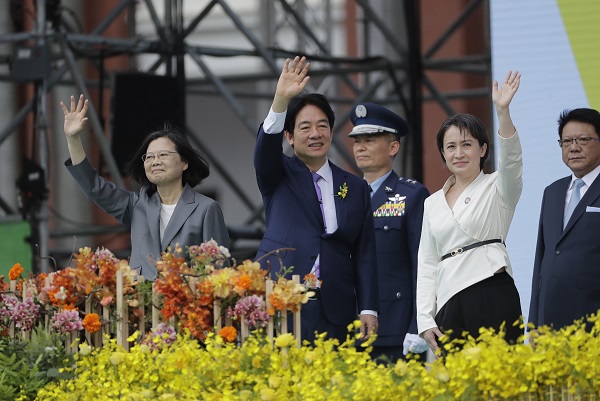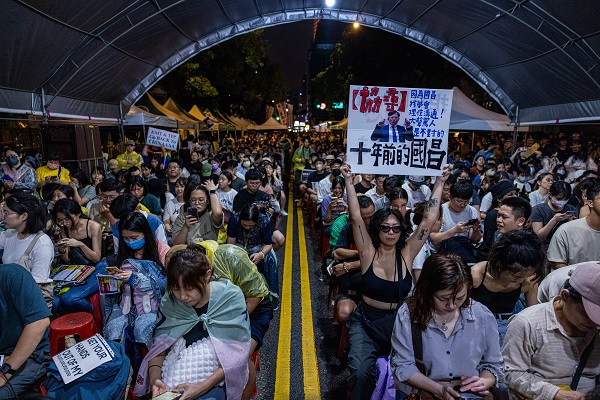Bloomberg News world news online news
(Bloomberg) Demonstrations are expected across Taiwan Friday in protest against a push by opposition lawmakers to pass a bill that would expand their powers and limit new President Lai Ching-te’s ability to govern in the most dangerous flashpoint in U.S.-China ties.
The changes would tighten parliament’s oversight of Lai’s government by expanding lawmakers’ investigative abilities to summon people from a range of backgrounds, including the president, to answer their questions. Individuals could be subject to fines and criminal punishment if they are found in contempt of the legislature.
Lai’s Democratic Progressive Party has vowed to fight the proposed changes, saying they aim “to undermine the constitution and disrupt government.” The opposition Kuomintang, China’s preferred negotiating partner in the chipmaking hub, said the ruling party is standing in the way of badly needed reforms.
(Please click onto the image of the cat to hear Oldies & Classic Rock)

If the DPP is right, the amendments could become a tool for the opposition to tie Lai’s government down in battles with the legislature during his four years in office. It could also impair his ability to enact policies, such as upgrading the island’s military as the U.S. has suggested.
world news online news
If passed, the changes to the law would likely to go into effect soon given the KMT-led opposition controls the legislature. Outmanned, the DPP has resorted to other measures to block the bill’s passage, sparking tussles between lawmakers over the past week and likely leading to more pushing and shoving on the floor of the parliament once debate resumes Friday.
What is the opposition doing and why?
The opposition says that reform is needed to create a better balance of power between the president and the legislature. It also says the changes are in line with previous proposals by the DPP.
The KMT and its opposition partner, the Taiwan People’s Party, say the bill would create more transparency and make the government more accountable. Opposition lawmakers say that in the past officials have deliberately dodged their questions during regular appearances in the legislature, falling short in their duty to explain their actions and policies.
The opposition wants the legislature to have the power to require government officials, the military, private entities and private individuals to provide witness testimony and documents to assist in probes. Individuals or entities that don’t comply could be repeatedly fined as much as NT$100,000 ($3,100). Officials who refuse to answer questions could face penalties of as much as NT$200,000, and people found to have lied could face fines or up to a year in prison.
world news online news
The law would also require the president to report to the chamber regularly and answer questions, something the opposition says will strengthen oversight of the island’s top leader.
Why is the ruling party unhappy with that?
The DPP and its supporters say the changes to the law amount to legislative overreach. They say the bill has been rushed though committees and their feedback ignored, an accusation the opposition denies.

One of the party’s chief concerns is that the bill could be weaponized to disrupt Lai’s government. The expansion of the legislature’s investigative powers opens the possibility of a single lawmaker being able to request all manner of sensitive or confidential information about the government’s operations, including military matters, according to the DPP.
That, combined with the possibility of jail time for officials found to have misled the legislature, could bog down the government in constant probes and possibly legal cases. Critics also worry it greatly increases the risk of confidential information being leaked.
world news online news
Will this affect Taiwan’s relations with China?
Taiwan’s constitution dictates that cross-strait relations and national defense are the president’s responsibilities. The ability to question and request information from the president under threat of jail time for not answering could give the legislature greater oversight of relations with China. The opponents of the bill says this would infringe upon the president’s ability to manage cross-strait relations and is therefore unconstitutional.
How could the president respond to the law?
He could ask the 15 justices of the Constitutional Court to rule on the constitutionality of the law. If the court declares the law unconstitutional, it would immediately become invalid. However, Lai can’t ask the court to intervene until the legislation formally becomes law. The court has a history of moving slowly, meaning Lai’s government would probably start facing probes in the legislature before the court is able to act.
He could also stall. Once passed, the legislature will send the law to the cabinet, which has the option to send it back to lawmakers to be reassessed in a process that could stretch to several weeks. Eventually, the cabinet will have to pass Lai the law to sign. He doesn’t have a veto but Taiwan politics could still find itself in an unprecedented situation should he refuse to sign the legislation. In the event of such an impasse, the Constitutional Court would likely be asked to rule on what should happen next. It hasn’t shied away from making difficult interpretations in the past, such as in 2017 when it ruled that laws must be changed to allow gay marriage.
world news online news
Lai would also have the nuclear option: seeking to dissolve parliament. Under Taiwan law, DPP lawmakers could file a no-confidence motion against their own premier, relieving him of his duties. The outgoing premier can then turn around and ask the president to dismiss the legislature.
If Lai did this, the political costs would likely be astronomical. Not only would he be sacrificing his own premier, he’d anger voters across the island for booting from office the lawmakers they elected just this past January.
What is the impact on markets?
It’s rare for domestic political confrontations to make a ripple. The benchmark Taiex remained stable during the Sunflower Movement back in 2014, during which protesters opposing a trade deal with China stormed and occupied parliament for several weeks during those demonstrations.
So far, this week’s protests have done little to stir investor concerns: the stock market hit new record highs in the two days following Tuesday’s initial protests, and the Taiwan dollar’s moves have been muted.
Still, any escalation of tensions could change things. Investors could also get worried if opposition legislators start demanding a bigger say in setting electricity prices — an issue that’s usually handled by the president’s ministers.
(With assistance from Miaojung Lin.)
©2024 Bloomberg News. Visit at bloomberg.com. Distributed by Tribune Content Agency, LLC.
world news online news


